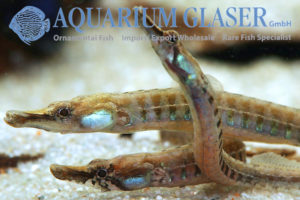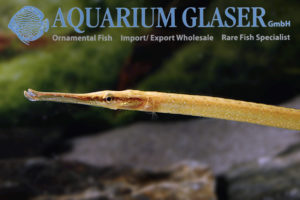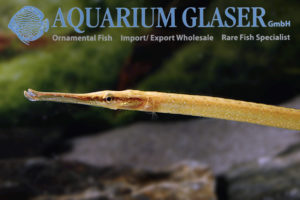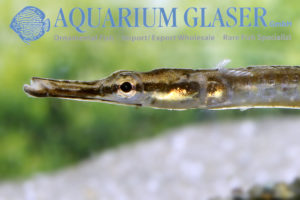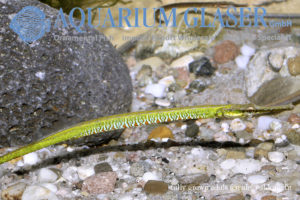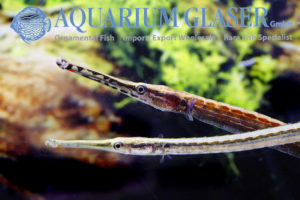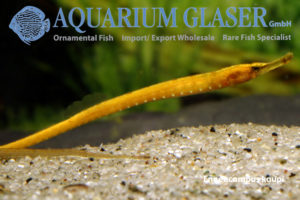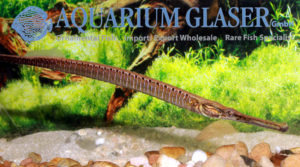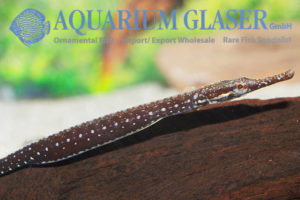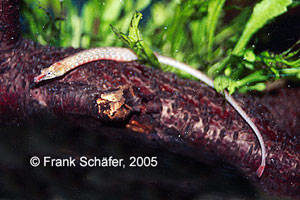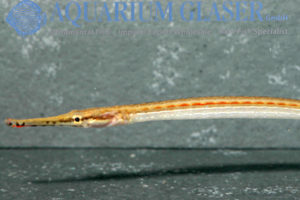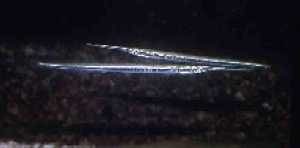The beautiful Enneacampus ansorgii is a small (8 – 12 cm) freshwater pipefish and at the same time the species most commonly available for the hobby, especially as it is propagated by commercial breeders. The ground-dwelling pipefish belongs to the short-snouted members of the family. It is native to West Africa and is occasionally offered […]
21. Seahorses and Pipefish (14)
-
-
Microphis brachyurus
The short-tailed freshwater pipefish (Microphis brachyurus) has been described from Indonesia. For a long time it was believed to be a species with a worldwide distribution, which differed only slightly at the subspecies level in the various distribution areas. And so M. lineatus (code 430104 on our stocklist) and M. aculeatus (code 149104) were considered […]
-
Microphis brachyurus
The short-tailed freshwater pipefish (Microphis brachyurus) has been described from Indonesia. For a long time it was believed to be a species with a worldwide distribution, which differed only slightly at the subspecies level in the various distribution areas. And so M. lineatus (code 430104 on our stocklist) and M. aculeatus (code 149104) were considered […]
-
Doryichthys martensii
The up to 15 cm long becoming freshwater pipefish Doryichthys martensii is widespread in southeast Asia, one knows it from Indonesia, Malaysia and Thailand. In nature, it is mainly found in flowing waters (streams, small rivers), where the animals can be found in the undergrowth of riparian vegetation. As with all pipefish, the male takes […]
-
Microphis deocata BRED
The probably prettiest freshwater pipefish is Microphis deocata from India. In its homeland it lives in clear running waters at the foot of the Himalaya. Unfortunately this pipefish is very sensitive to transport. It neither tolerates water deterioration nor can it starve for long. As a food specialist it also requires living food, this species […]
-
Microphis aculeatus
Only very rarely we obtain the freshwater pipefish Microphis aculeatus from Nigeria. The fish belong to the free swimming members of the family and are very attractive. As in all pipefish the male has to care for the eggs until they hatch. The eggs are deposited in a pouch along the belly. So the male […]
-
Freshwater pipefish from West Africa
There are three species of freshwater pipefish known to occur in West Africa. They live in inland waters along the coast and have a very wide distribution. One can find these fishes from the Senegal to Angola (roughly 16°N to 18°S). The term „West Africa“ is not used here in the sense of the UN, […]
-
Doryichthys boaja
Once more we were able to import the largest and most beautiful of all freshwater pipefish. This species occurs only in pure freshwater! Maximum size reported is around 40 cm. For our customers: the animals have code 414294 on our stocklist. Please note that we exclusively supply the wholesale trade. Text & photos: Frank Schäfer
-
Hippichthys penicillus
Currently we were able to import a new species of freshwater pipefish from India: Hippichthys penicillus. Basically speaking, there are two types of pipefish. First, the ones that swim free in the water column, imitating plant material (sticks etc.). Twice the ones that are bottom-dwellers and crawl like snakes between plants, stones, roots etc.. The […]
-
Enneacampus ansorgii
The small freshwater pipefish originates from Western Africa, from Cameroon to Gabun and in the Zaire- and Ogowe River. These fish inhabit freshwater as well as brackish water habitats. Addition of sea salt (1-2 teaspoons per 10 litre of water) will therefore increase the vitality of these fish. This species, but actually all freshwater pipefish, […]
-
Microphis lineatus
The species Microphis lineatus inhabits the (sub) tropical coastal waters of the American continent. This pelagic pipefish grows up to 22 cm lengths and has a very long slender snout with red spots and blotches. The body is brown or greenish above and pale below. There are very small white spots on the body and […]
-
Potamorrhaphis guianensis
These fish belonging to needlefish (Belonidae) reach the aquariums of interested hobbyists only very seldom. These robbers, called halfbeak, come from almost all over Amazonia. You can find them also in the Orinoco catchment area as well as in the Guyana countries. These specialized surface fish are only suitable for the the hobbyists with restrictions […]
-
Pseudophallus mindii
Pseudophallus mindii is a short snouted pipefish, which reached us as a by-catch in two exemplars. Their distribution contains central and tropical South America, where it is found predominantly in freshwater habitats. Adults were caught from estuaries and mangrove areas too, while planktonic juveniles have been collected well offshore at sea. As other pipefishes and […]
Gorgeous pipefish arrived from Nigeria!


Only
very rarely we obtain the freshwater pipefish Microphis aculeatus from
Nigeria. The fish belong to the free swimming members of the family and
are very attractive. As in all pipefish the male has to care for the
eggs until they hatch. The eggs are deposited in a pouch along the
belly. So the male can be easily recognized by the totally different
shape of the body. Moreover the up to 15 cm long males (females stay a
bit smaller) have a pretty red stripe along the back and a nice pattern
on the snout.


For our customers: the fish have code 149204 on our stocklist. Please note that we exclusively supply the wholesale trade.




Text & photos: Frank Schäfer





